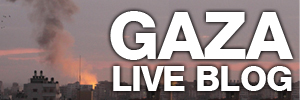The media double standards in the West on the new and tragic Israeli escalation of violence directed at Gaza were epitomised by an absurdly partisan New York Times front page headline: "Rockets Target Jerusalem; Israel girds for Gaza Invasion" (NYT, Nov 16, 2012). Decoded somewhat, the message is this: Hamas is the aggressor, and Israel when and if it launches a ground attack on Gaza must expect itself to be further attacked by rockets. This is a stunningly Orwellian re-phrasing of reality.
The true situation is, of course, quite the opposite: Namely, that the defenseless population of Gaza can be assumed now to be acutely fearful of an all out imminent Israeli assault, while it is also true, without minimising the reality of a threat, that some rockets fired from Gaza fell harmlessly (although with admittedly menacing implications) on the outskirts of Jerusalem and Tel Aviv. There is such a gross disproportion in the capacity of the two sides to inflict damage and suffering due to Israeli total military dominance as to make perverse this reversal of concerns to what might befall Israeli society if the attack on Gaza further intensifies.
The reliance by Hamas and the various Gaza militias on indiscriminate, even if wildly inaccurate and generally harmless, rockets is a criminal violation of international humanitarian law, but the low number of casualties caused and the minor damage caused, needs to be assessed in the overall context of massive violence inflicted on the Palestinians. The widespread non-Western perception of the new cycle of violence involving Gaza is that it looks like a repetition of Israeli aggression against Gaza in late 2008, early 2009, that similarly fell between the end of American presidential elections and scheduled Israeli parliamentary elections.
Pointing fingers
There is the usual discussion over where to locate responsibility for the initial act in this renewed upsurge violence. Is it some shots fired from Gaza across the border and aimed at an armoured Israeli jeep or was it the targeted killing by an Israeli missile of Ahmed Jabari, leader of the military wing of Hamas, a few days later? Or some other act by one side or the other? Or is it the continuous violence against the people of Gaza arising from the blockade that has been imposed since mid-2007?
The assassination of Jabari came a few days after an informal truce that had been negotiated through the good offices of Egypt, and quite ironically agreed to by none other than Jabari acting on behalf of Hamas. Killing him was clearly intended as a major provocation, disrupting a carefully negotiated effort to avoid another tit-for-tat sequence of violence of the sort that has periodically taken place during the last several years.
An assassination of such a high profile Palestinian political figure as Jabari is not a spontaneous act. It is based on elaborate surveillance over a long period, and is obviously planned well in advance partly with the hope of avoiding collateral damage, and thus limiting unfavourable publicity. Such an extra-judicial killing, although also part and parcel of the new American ethos of drone warfare, remains an unlawful tactic of conflict, denying adversary political leaders separated from combat any opportunity to defend themselves against accusations, and implies a rejection of any disposition to seek a peaceful resolution of a political conflict. It amounts to the imposition of capital punishment without due process, a denial of elementary rights to confront an accuser.
Putting aside the niceties of law, the Israeli leadership knew exactly what it was doing when it broke the truce and assassinated such a prominent Hamas leader, someone generally thought to be second only to the Gaza prime minister, Ismail Haniya. There have been rumours, and veiled threats, for months that the Netanyahu government plans a major assault of Gaza, and the timing of the ongoing attacks seems to coincide with the dynamics of Israeli internal politics, especially the traditional Israeli practice of shoring up the image of toughness of the existing leadership in Tel Aviv as a way of inducing Israeli citizens to feel fearful, yet protected, before casting their ballots.
Under siege
Beneath the horrific violence, which exposes the utter vulnerability, of all those living as captives in Gaza, which is one of the most crowded and impoverished communities on the planet, is a frightful structure of human abuse that the international community continues to turn its back upon, while preaching elsewhere adherence to the norm of "responsibility to protect" whenever it suits NATO. More than half of the 1.6 million Gazans are refugees living in a total area of just over twice the size of the city of Washington, DC. The population has endured a punitive blockade since mid-2007 that makes daily life intolerable, and Gaza has been harshly occupied ever since 1967.
Israel has tried to fool the world by setting forth its narrative of a good faith withdrawal from Gaza in 2005, which was exploited by Palestinian militants at the time as an opportunity to launch deadly rocket attacks. The counter-narrative, accepted by most independent observers, is that the Israeli removal of troops and settlements was little more than a mere redeployment to the borders of Gaza, with absolute control over what goes in and what leaves, maintaining an open season of a license to kill at will, with no accountability and no adverse consequences, backed without question by the US government.
From an international law point of view, Israel's purported "disengagement" from Gaza didn't end its responsibility as an Occupying Power under the Geneva Conventions, and thus its master plan of subjecting the entire population of Gaza to severe forms of collective punishment amounts to a continuing crime against humanity, as well as a flagrant violation of Article 33 of Geneva IV. It is not surprising that so many who have observed the plight of Gaza at close range have described it as "the largest open air prison in the world".
The Netanyahu government pursues a policy that is best understood from the perspective of settler colonialism. What distinguishes settler colonialism from other forms of colonialism is the resolve of the colonialists not only to exploit and dominate, but to make the land their own and superimpose their own culture on that of indigenous population. In this respect, Israel is well served by the Hamas/Fatah split, and seeks to induce the oppressed Palestinian to give up their identity along with their resistance struggle even to the extent of asking Palestinians in Israel to take an oath of loyalty to Israel as "a Jewish state".
Actually, unlike the West Bank and East Jerusalem, Israel has no long-term territorial ambitions in Gaza. Israel's short-term solution to its so-called "demographic problem" (that is, worries about the increase in the population of Palestinians relative to Jews) could be greatly eased if Egypt would absorb Gaza, or if Gaza would become a permanently separate entity, provided it could be reliably demilitarised. What makes Gaza presently useful to the Israelis is their capacity to manage the level of violence, both as a distraction from other concerns (eg backing down in relation to Iran; accelerated expansion of the settlements) and as a way of convincing their own people that dangerous enemies remain and must be dealt with by the iron fist of Israeli militarism.
No peace
In the background, but not very far removed from the understanding of observers, are two closely related developments. The first is the degree to which the continuing expansion of Israeli settlements has made it unrealistic to suppose that a viable Palestinian state will ever emerge from direct negotiations. The second, underscored by the recent merger of Netanyahu and Lieberman forces, is the extent to which the Israeli governing process has indirectly itself irreversibly embraced the vision of Greater Israel encompassing all of Jerusalem and most of the West Bank.
The fact that world leaders in the West keep repeating the mantra of peace through direct negotiations is either an expression of the grossest incompetence or totally bad faith. At minimum, Washington and the others calling for the resumption of direct negotiations owe it to all of us to explain how it will be possible to establish a Palestinian state within 1967 borders when it means the displacement of most of the 600,000 armed settlers now defended by the Israeli army, and spread throughout occupied Palestine. Such an explanation would also have to show why Israel is being allowed to quietly legalise the 100 or so "outposts", settlements spread around the West Bank that had been previously unlawful even under Israeli law. Such moves toward legalisation deserve the urgent attention of all those who continue to proclaim their faith in a two-state solution, but instead are ignored.
This brings us back to Gaza and Hamas. The top Hamas leaders have made it abundantly clear over and over again that they are open to permanent peace with Israel if there is a total withdrawal to the 1967 borders (22 percent of historic Palestine) and the arrangement is supported by a referendum of all Palestinians living under occupation.
Israel, with the backing of Washington, takes the position that Hamas as "a terrorist organisation" that must be permanently excluded from the procedures of diplomacy, except of course when it serves Israel's purposes to negotiate with Hamas. It did this in 2011 when it negotiated the prisoner exchange in which several hundred Palestinians were released from Israeli prisons in exchange for the release of the Israel soldier captive, Gilad Shalit, or when it seems convenient to take advantage of Egyptian mediation to establish temporary ceasefires.

As the celebrated Israeli peace activist and former Knesset member, Uri Avnery, reminds us a cease-fire in Arab culture,hudna in Arabic, is considered to be sanctified by Allah, has tended to be in use and faithfully observed ever since the time of the Crusades. Avnery also reports that up to the time he was assassinated, Jabari was in contact with Gershon Baskin of Israel, seeking to explore prospects for a long-term ceasefire that was reported to Israeli leaders, who unsurprisingly showed no interest.
Waiting for justice
There is a further feature of this renewal of conflict involving attacks on Gaza. Israel sometimes insists that since it is no longer, according to its claims, an occupying power, it is in a state of war with a Hamas governed Gaza. But if this were to be taken as the proper legal description of the relationship between the two sides, then Gaza would have the rights of a combatant, including the option to use proportionate force against Israeli military targets. As earlier argued, such a legal description of the relationship between Israel and Gaza is unacceptable. Gaza remains occupied and essentially helpless, and Israel as occupier has no legal or ethical right to engage in war against the people and government of Gaza, which incidentally was elected in internationally monitored free elections in early 2006.
On the contrary, its overriding obligation as Occupier is to protect the civilian population of Gaza. Even if casualty figures in the present violence are so far low as compared with Operation Cast Lead, the intensity of air and sea strikes against the helpless people of Gaza strikes terror in the hearts and minds of every person living in the Strip, a form of indiscriminate violence against the spirit and mental health of an entire people that cannot be measured in blood and flesh, but by reference to the traumatising fear that has been generated.
We hear many claims in the West as to a supposed decline in international warfare since the collapse of the Soviet Union twenty years ago. Such claims are to some extent a welcome development, but the people of the Middle East have yet to benefit from this trend, least of all the people of Occupied Palestine, and of these, the people of Gaza are suffering the most acutely. This spectacle of one-sided war in which Israel decides how much violence to unleash, and Gaza waits to be struck, firing off militarily meaningless salvos of rockets as a gesture of resistance, represents a shameful breakdown of civilisation values. These rockets do spread fear and cause trauma among Israeli civilians even when no targets are struck, and represent an unacceptable tactic. Yet such unacceptability must be weighed against the unacceptable tactics of an Israel that holds all the cards in the conflict.
It is truly alarming that now even the holiest of cities, Jerusalem, is threatened with attacks, but the continuation of oppressive conditions for the people of Gaza, inevitably leads to increasing levels of frustration, in effect, cries of help that world has ignored at its peril for decades. These are survival screams! To realise this is not to exaggerate! To gain perspective, it is only necessary to read a recent UN Report that concludes that the deterioration of services and conditions will make Gaza uninhabitable by 2020.
Completely aside from the merits of the grievances on the two sides, one side is militarily omnipotent and the other side crouches helplessly in fear. Such a grotesque reality passes under the radar screens of world conscience because of the geopolitical shield behind which Israel is given a free pass to do whatever it wishes. Such a circumstance is morally unendurable, and should be politically unacceptable. It needs to be actively opposed globally by every person, government, and institution of good will.
Richard Falk is the United Nations Special Rapporteur on Palestinian human rights.
The views expressed in this article are the author's own and do not necessarily reflect Al Jazeera's editorial policy.
http://www.aljazeera.com/indepth/opinion/2012/11/2012111874429224963.html
Read More >>>>
Stuart Littlewood views the ideology of Christian Zionism, which is rampant in the United States and has made some inroads in other "Christian" societies, and argues that, in essence, Christian Zionism is "a gross corruption of ...
Zionist Christians: Useful tool for Zionist Jews. Christian Zionists believe that in order to fulfill Biblical prophecy, Israel must conquer most of the Middle East. They are a growing force in American politics with ties to many ...
If you are as puzzled as I am as to how a true Christian could possibly be taken in by Zionism, a short paper on the phenomenon is available from the Irish-Palestinian alliance, Sadaka. Sadaka sums up the Christian Zionist .
The notorious crusades were initiated in by Pope Urban 2nd in 1096 when the Church was losing its hold on Christians, this ploy was used by them to bring the Christians back under the yoke of the Church. As a reaction to ...
| 






